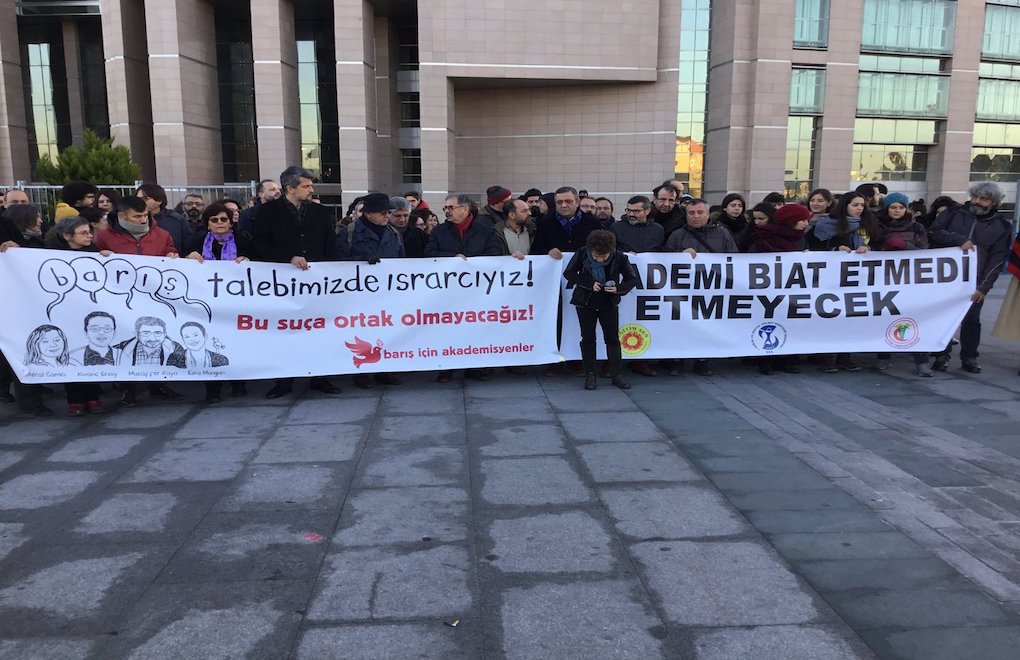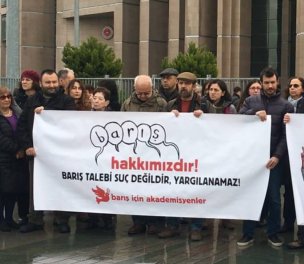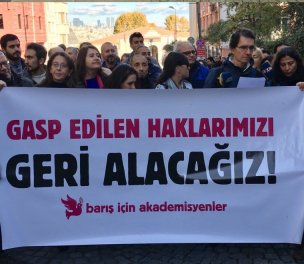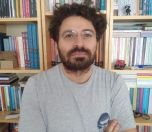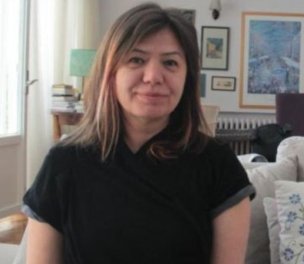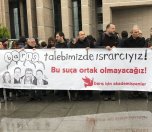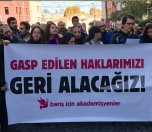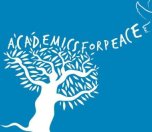Click to read the article in Turkish
Despite a Constitutional Court ruling that the rights of the Academics for Peace were violated, administrative courts reject the applications for stay of execution regarding the academics' dismissal, according to a report by the Human Rights Foundation of Turkey (TİHV).
More than 2,000 academics were put on trial for signing a 2016 declaration titled, "We will not be a party to this crime," which criticized the human rights violations during the conflict in the Kurdish-majority southeast.
Following the top court verdict last July, 622 of the 822 cases have ended in acquittal. Some courts tend to extend trials and delay acquittal decisions, according to the TİHV.
Also, the academics were not able to return to their duties despite being acquitted, the foundation noted.
During the two-year state of emergency period following the July 2016 coup attempt, 406 academics were dismissed upon statutory decrees, 89 were dismissed "by other means," 72 were forced to resign and 27 were forced to retire, according to the report.
After the state of emergency ended on July 20, 2018, some of the dismissed academics applied to administrative courts, requesting their reinstatement on the grounds that actions taken during the state of emergency could not continue after it was lifted.
However, the applications were rejected despite rulings by the Council of State and the Constitutional Court, which meant that it was up to the State of Emergency Procedures Review Commission whether the academics would be reinstated or not.
The Commission has so far given a decision about the applications of 108,200 of 126,300 people who were dismissed from public service upon statutory decrees. It has rejected 88 percent of the applications.
"The State of Emergency Procedures Review Commission continues to ignore the Constitutional Court's ruling and the numerous verdicts of acquittal given by courts of first instance," the report said.
One of the violations against the Academics for Peace was the confiscation of passports.
While an amendment to the Passport Law on October 24, 2019, allows those who were dismissed from public service upon a statutory decree to acquire a passport, "arbitrary restrictions" have not totally ended because of the procedures and the logic of the regulation, according to the report.
While some academics were able to get their passports back and go abroad, some did not receive a response to their applications, it said.
Reinstatement of rights
The TİHV listed what needs to be done in to prevent further right violations of the academics:
- In cases that still continue at local courts, verdicts of acquittal should be given immediately without new hearings.
- All of the 406 academics who were dismissed upon a statutory decree should be reinstated to their jobs in the institutions they worked at.
- Regulation should be made to prevent the loss of rights for those who were employed as part of the Lecturer Training Program.
- Passport confiscations should be immediately and unconditionally lifted.
- The Higher Education Council (YÖK) should urgently provide the conditions for those who were dismissed by other means that statutory decrees (those whose contracts were terminated or not renewed or those who were forced to resign or retire) to return to their jobs.
- The "blacklist" practice against those who continued their graduate education at the time they signed the declaration should end.
About the Trials of AcademicsOn January 10, 2016, 1,128 academics published a declaration entitled "We will not be party to this crime" on behalf of the Academics for Peace initiative. With the participation of further academics, the number of academics who have signed the declaration has reached 2,212. With the indictment issued by the Prosecutor İsmet Bozkurt, lawsuits were filed against the academics on charge of "propagandizing for a terrorist organization" as per the Article No. 7/2 of the Anti-Terror Law No. 3713. As of October 30, 2019, 806 academics had stood trial since December 5, 2017, all the 204 academics whose cases were concluded were sentenced to prison. 146 of these academics were sentenced to 1 year and 3 months in prison; 8 academics to 1 year and 6 months in prison; 18 academics to 1 year, 10 months and 15 days in prison; 17 academics to 2 years and 3 months in prison; 7 academics to 2 years and 6 months in prison; 5 academics to 2 years and 1 month in prison; and one academic to 3 years in prison. Non-deferred prison sentences for 36 people Of these 204 people, the verdicts of conviction of 36 academics in total were not deferred; while the verdicts of 29 people were not deferred as their prison terms are over 2 years (as per the Article 286 of the Law on Criminal Courts), the verdicts of 7 academics were not deferred as they did not accept the deferment of the announcement of their verdicts. With her 15-month prison sentence upheld by the court of appeal, Academic for Peace Prof. Dr. Füsun Üstel was arrested on May 8, 2019 to be released on July 22. Constitutional Court said "violation of right" The General Assembly of the Constitutional Court examined the individual applications of 10 Academics for Peace sentenced to prison on charge of "propagandizing for a terrorist organization" for having signed the peace declaration. On July 26, 2019, the Court ruled that the penalization of Academics for Peace on charge of "terror propaganda" has violated their freedom of expression. The Court decided that a copy of this judgement shall be sent to all local courts in order to eliminate this right's violation and advised for retrial. The court also ruled to pay each applicant 9 thousand TRY in reparations. Acquittals After the new judicial year opened on September 2, the first verdict of acquittal for an Academic for Peace in accordance with the Constitutional Court ruling was given by the İstanbul 30th Heavy Penal Court on September 6. Since then, 27 courts have given verdicts of acquittal for Academics for Peace. Constitutional Court ruling and its consequences The ruling of the Constitutional Court stipulates that the local courts shall hold re-trials and give verdicts of acquittal in ongoing cases and for finalized sentences and the courts of appeal shall reverse the judgements in question. The State of Emergency Commission, which has not yet given its decision regarding the applications of discharged academics, shall also take the Constitutional Court ruling into account. However, it can still give contrary rulings. In the event that the Commission gives a decision against the academics, they will have the right to appeal to the Council of State. Though the Constitutional Court ruling is binding for the Council of State, any possible failure to withdraw the decisions of discharge will also be examined by the Constitutional Court. You can reach all news on Trials of Academics here You can reach the statements of Academics for Peace in English here |
Click to read the full report [Turkish]
(TP/VK)




